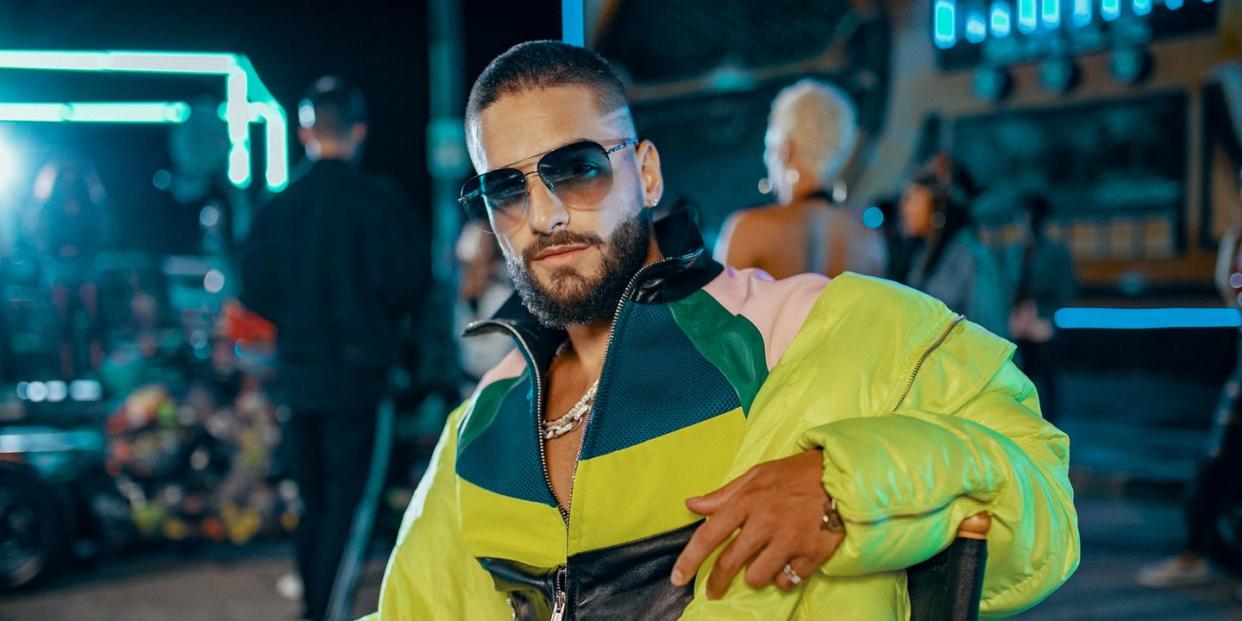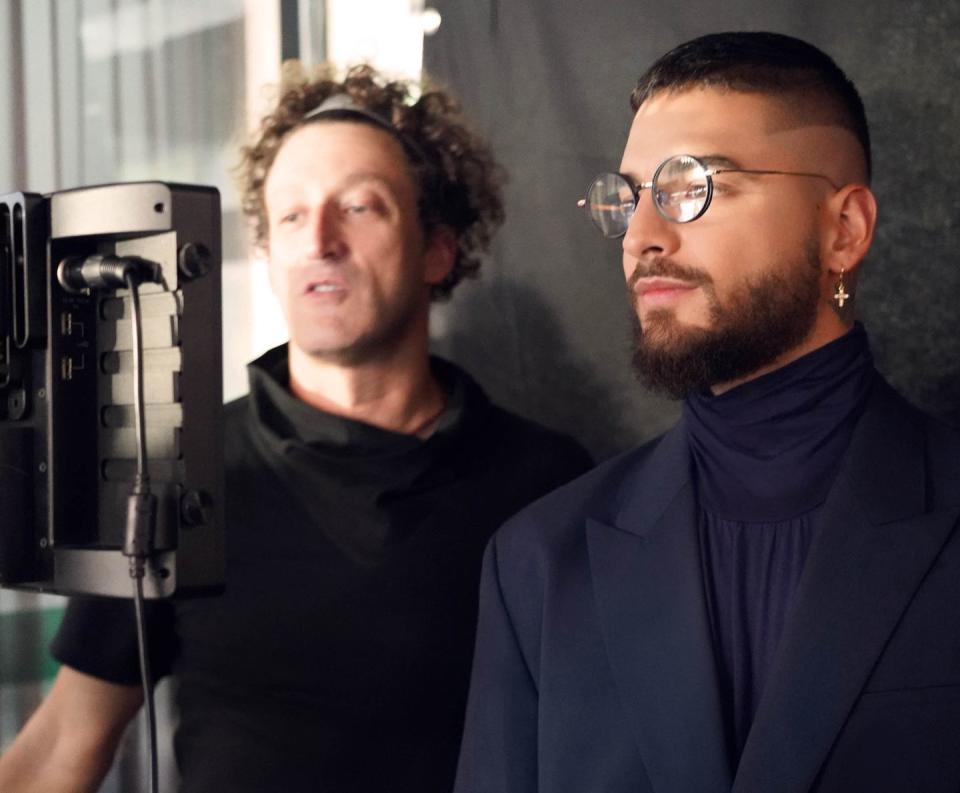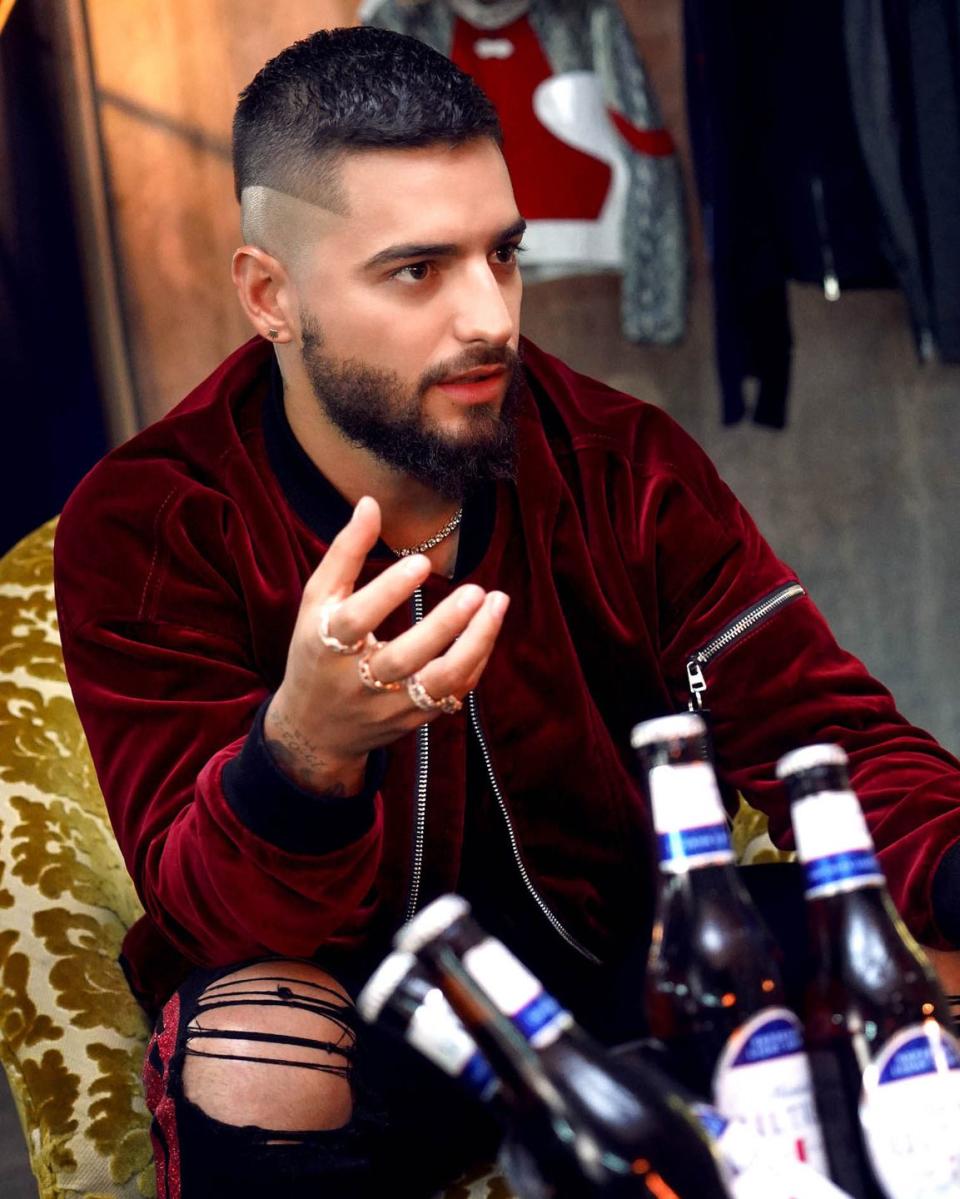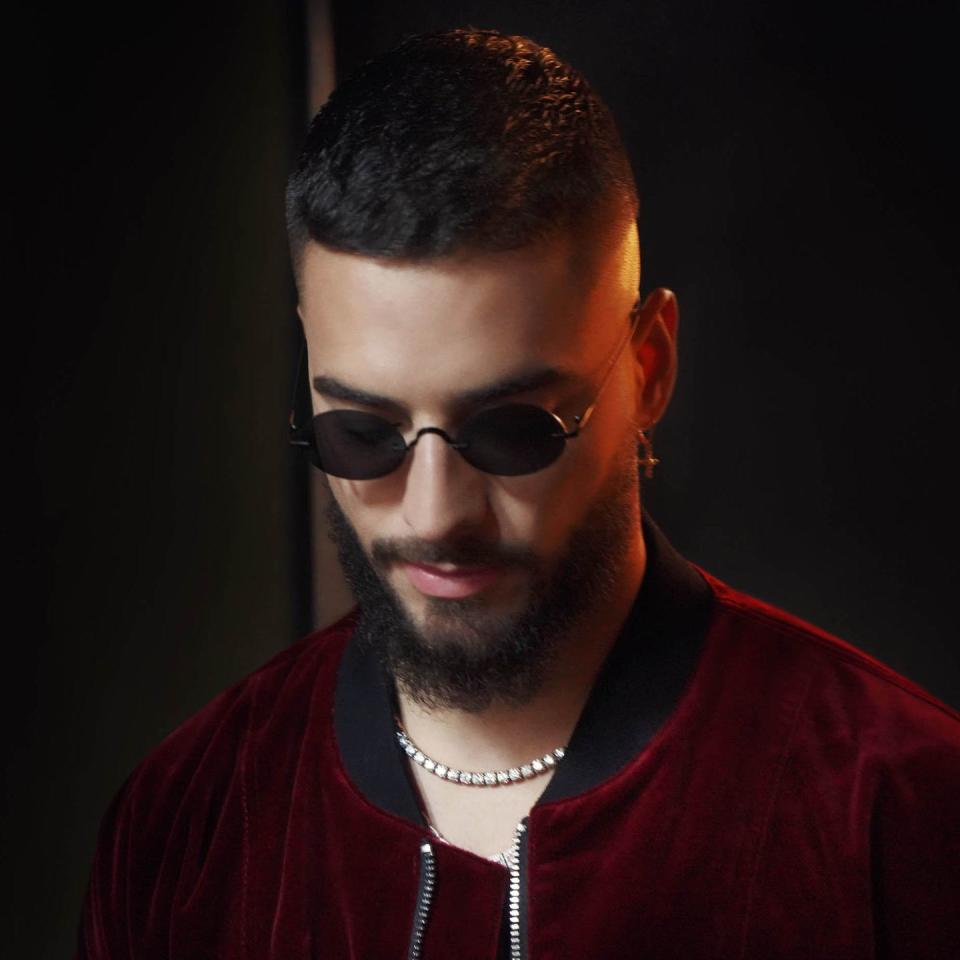Latin Superstar Maluma Wants to Change Colombia's Narcos Image

“Ma-Lu-Maaaa!” The sing-song chant gives way to a fit of giggles from a trio of little niñas, no taller than a stack of phone books, staking their claim on a railing high above Medellín’s once-infamous Comuna 13. “MA-LU-MAAAA!” they try again, louder this time, cutting through the pitter-patter of rain and the grumbling of a film crew who came to shoot a rooftop music video, but ended up with an April shower instead. Undeterred by a little weather, however, are the residents of this mountainside neighborhood, and the air crackles with excitement as word of their famous visitor begins to spread.
“Did you see him?” a lone police officer asks me. He’s grinning from ear to ear, and it’s not clear if he’s on duty or simply enjoying the spectacle alongside the rest of us. Before I can answer, he’s already moving in closer to the action-what started as a drizzle has upgraded to a full-on downpour, the video crew is calling it a night, and the man of the hour appears to be heading home. But there are no VIP tunnels in the barrio, no side exits-not even for a 25-year-old global superstar-so he’ll have to make his way past a growing crowd of eager fans, curious onlookers, an American journalist, and at least one very giddy officer of the law.
Our run-in here is a total coincidence, of course. I’m with my photographer and her assistant on our day off; we aren’t scheduled to meet the artist until the next day, while he shoots a beer commercial in an undisclosed location. Stopping by the city’s once most-notorious neighborhood only to end up five feet away from its current most famous resident feels a bit like landing in Hollywood in the ‘80s and bumping into Tom Cruise, or perhaps hopping into a pickup basketball game in Chicago with Michael Jordan.
The notion of “magical realism” is most often attributed to the late Colombian Nobel laureate Gabriel Garcia Marquez, author of One Hundred Years of Solitude. It’s a literary genre that paints the magical and supernatural in our own world, rather than inventing new ones. With the rain pouring all around us, it’s nothing short of magical to watch Maluma, like the Pied Piper of Medellín, lead his adoring flock up the neighborhood’s series of outdoor escalators, down the rain-drenched streets, all the while stopping to thank the fans and friends he passes along the way. We offer up a wave as the procession passes by, but for tonight, we’re still strangers. This moment, after all, is for these kids. For the comuna. It’s a night they’ll remember forever.
Juan Luis Londoño Arias was born on January 28, 1994, one month after Pablo Escobar met his bloody end on a Medellín rooftop. Better known as Maluma, Londoño Arias never knew what it was like to live with the Medellín Cartel in his own backyard, though Hollywood-from Entourage to Narcos-insists on reminding everyone, including Colombians who’d likely prefer to forget, what it could have looked like, thanks to some overly generous casting and a “creative” interpretation of history itself. But for Maluma, a world without Escobar was just a world without Escobar.
“It was clear in the streets that there were a lot of bad things happening-the narcos, all that shit,” Maluma tells me. “But growing up, I didn’t feel that violence, because I grew up in a very peaceful place with a very lovely family.”
One part of that very lovely family is here: His mother Marlli has joined us on set, and the undisclosed location turns out to be Telemedellín Canal Parque, the local TV station that has plenty of room for a video shoot, no rain delays necessary. There are a few dozen extras here, a film crew, some caterers, and a sense that we couldn’t be farther from an ugliness that defined their beautiful country for far too long. The new face of Colombia, of Medellín, just wants to see his people dance.
Family is everything to Maluma: It’s right there in his stage name, a portmanteau that pays tribute to his mother Marlli (MA), father Luis (LU), and sister Manuela (MA). And he credits his grandfather for introducing him to salsa, the hip-swervy Latin genre that originated in New York’s Cuban and Puerto Rican communities that inspired him to pursue music in the first place.

“My grandfather was one of the biggest collectors of salsa in Colombia, so I used to go to his house every Sunday and listen,” Maluma says. “When I started growing up, I started listening to rap and hip-hop, and then I discovered reggaeton, and all of these Latin rhythms that I’m doing now, but my favorite is salsa. That’s how I discovered the love I feel for music.”
That love has taken him to some incredible places already-since his debut album Magia in 2012, Maluma has scored a Latin Grammy (for 2018’s F.A.M.E.), a Super Bowl commercial with Michelob ULTRA, musical collaborations with legends from Shakira to Marc Anthony to Madonna (on the just-released “Medellín”), and an Instagram following that puts him neck-and-neck with, yes, NASA. Not bad for a kid who just entered the quarter-century club.
Today, his second campaign with Michelob ULTRA launches, a global spot airing both in English and Spanish, ensuring if you don’t know the name “Maluma” yet, get familiar, because if his performance at the Billboard Music Awards, debut at the MET Gala, and upcoming album 11:11 (dropping May 17) weren’t indication enough-it’s about to be everywhere.
“We did the Super Bowl commercial before, but it’s time to show a little bit more, ‘Who is Maluma?’” he says. “It’s a very nice opportunity for me to work with them again. I feel very proud and very honored because this is the first time that they’ve worked with a Latin artist, so it’s a big, big opportunity to tell the world what Latin culture is all about.”
So what is Latin culture all about?
“We are a very brave people, very brave,” he says. “I think that strength is what we want to show to the world. We’re flavor, too! That Latin flavor, it’s something different, right? It’s nice to show the positive things about the culture-it’s not only Pablo Escobar. It’s not only streets, violence, and drugs. We’re supporting each other, we’re proud, and we’re doing great things for the world.”
For Maluma, embracing his own heritage is just as important as family-especially at a time when simply being Latino in the public eye is a political statement in itself. Though success has afforded him houses in both Miami and Los Angeles, Medellín is the only place he wants to call home.
“I prefer Colombia over everything because it’s my roots,” he says. “I cannot leave my roots. When I started my career, the first people that listened to my music were the kids here, from Medellín, from the hood. I embrace my country, embrace my flag, and I feel proud of it. When I was very young, I was watching all these American movies, and everybody in the Latin culture wanted the 'American Dream,' they wanted to go the United States. Of course we find a lot of opportunities in America, but I think we feel more proud of being Latin than we used to be, because we have the opportunities here in Latin America right now. We live in a very big moment, we have to take advantage of it."
It’s a perspective he shares with his fellow countryman and reggaeton superstar J Balvin (who you know for bops like “Con Altura” with Latin megastar-on-deck Rosalía, and 2018’s undeniable “I Like It” with Cardi B and Bad Bunny), who also still resides in his home city of Medellín.

“He’s a brother for me,” says Maluma of Balvin. “I respect everything that he’s doing for himself, for the culture, for everybody, and he deserves all the good things that are happening to his life.”
While Maluma is quick to credit those who’ve inspired and taught him-Daddy Yankee, Wisin y Yandel, Ricky Martin, Balvin-he also wants to pay his own good fortune forward, and help the next generation of kids who have the same dreams he did. He even started a foundation, El Arte de los Sueños, to foster art education for vulnerable and at-risk youth.
“When I go to Comuna 13, I see all these little kids trying to make it; they are dreamers like me,” he says. “We give them dance lessons, composing lessons, and what I’m doing right now is trying to rescue these kids from the hood, give them hope, give them opportunity.”
What we can learn about an artist from an ad spot aside, “Who is Maluma?” seems to have a simple enough answer-the songs, such as “Mala Mía” (“My Bad”) and “Amigos con Derechos” (“Friends with Benefits”) speak for themselves: He goes out! He drinks! Hey, he’s a pop star. But what about Juan Luis? He’s careful to recognize the difference.
“When I’m on stage, I’m singing my songs, but when I go to my house, I try to keep the balance-just chill, pray, meditate, do yoga. I feel like those things are gonna feed my soul,” he says.
“I have to understand that I have two roles in my life,” he adds. “One is Maluma-that’s my career, and I have to feel grateful. That’s what I love. But there’s the other side that is Juan Luis that I have to take care of, too, because if I lose my soul, my spirit, there’s not gonna be any Maluma anymore. So I have to keep the balance and understand both sides.”
It’s a refreshing perspective from a young artist who essentially has the world in his hands, especially one who found that fame when he was still a teenager. And despite achieving a level of success that most of his peers can only dream of, he still feels like this is just the beginning.

“I have a lot of goals in my life. Of course I wanna get an American Grammy. I wanna have a bunch of sold-out concerts. I wanna go to Asia. But I feel like my biggest goal is keep being happy. Keep working with passion. Enjoying my life. I’m young, I’m 25 years old right now, and I see so many things that are coming. I don’t wanna lose my mind; I wanna keep grounded, and keep helping the world,” he says.
But he does have one very specific goal in mind.
“I wanna work with Justin Timberlake! He’s one of my idols, since I was a little kid,” he laughs. “I think that I said it so many times [with Madonna] that I wanted to work with her so bad, and it happened. And now I’m giving the energy to Justin Timberlake. Hey, it could happen.”
In the land of magical realism, where a kid from Medellín is poised to take over the globe-you’d almost be crazy to think it won’t.
“I have no rush,” he says. “Destiny is gonna come, and I’ll receive it with all my heart.”
('You Might Also Like',)

